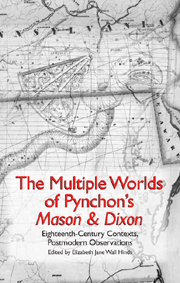 The Multiple Worlds of Pynchon's 'Mason and Dixon'
The Multiple Worlds of Pynchon's 'Mason and Dixon' Book contents
- Frontmatter
- Contents
- Preface
- Note on Quotations from Mason & Dixon
- The Rounds of History
- Consumption Then and Now
- Space and Power
- 4 “America was the only place …”: American Exceptionalism and the Geographic Politics of Pynchon's Mason & Dixon
- 5 Postmodernism at Sea: The Quest for Longitude in Thomas Pynchon's Mason & Dixon and Umberto Eco's The Island of the Day Before
- Enlightenment Microhistories
- Works Cited
- Notes on the Contributors
- Index
4 - “America was the only place …”: American Exceptionalism and the Geographic Politics of Pynchon's Mason & Dixon
from Space and Power
Published online by Cambridge University Press: 12 September 2012
- Frontmatter
- Contents
- Preface
- Note on Quotations from Mason & Dixon
- The Rounds of History
- Consumption Then and Now
- Space and Power
- 4 “America was the only place …”: American Exceptionalism and the Geographic Politics of Pynchon's Mason & Dixon
- 5 Postmodernism at Sea: The Quest for Longitude in Thomas Pynchon's Mason & Dixon and Umberto Eco's The Island of the Day Before
- Enlightenment Microhistories
- Works Cited
- Notes on the Contributors
- Index
Summary
But should [the poet] venture upon the dark story of their wrongs and wretchedness; should he tell how they were invaded, corrupted, despoiled, driven from their native abodes and the sepulchers of their fathers, hunted like wild beasts about the earth, and sent down with violence and butchery to the grave, posterity will either turn with horror and incredulity from the tale, or blush with indignation at the inhumanity of their forefathers.
— Washington IrvingIRVING OUTLINED THE TROUBLED, ambivalent attitudes toward the genocide committed against Native Americans by whites: incredulity — confirmed by a silence, which not always sounds condemnatory — or indignation — spoken through many acts of contrition — are only two, perhaps the most prevalent, of the many possible outlooks on the American Holocaust. Assuming the relentless impact of the Westward expansion of the country, Irving's prediction anticipates the destruction not only of the East Coast Indians, but of all the Native American peoples and their ways of life across the territory claimed by the United States in successive years: “They will vanish like a vapor from the face of the earth; their very history will be lost in forgetfulness” (361). With a mixture of liberal nostalgia and historical fatalism, Washington Irving endorsed the prevailing myth of the “vanishing Indian,” a theme that would pervade American culture into the twentieth century. The reverse trope of this historical fatalism — its photographic negative — is, of course, the grand narrative of Manifest Destiny: the American nation as a triumphant exception in a history of constant decline and depravation.
- Type
- Chapter
- Information
- The Multiple Worlds of Pynchon's 'Mason and Dixon'Eighteenth-Century Contexts, Postmodern Observations, pp. 101 - 124Publisher: Boydell & BrewerPrint publication year: 2005
